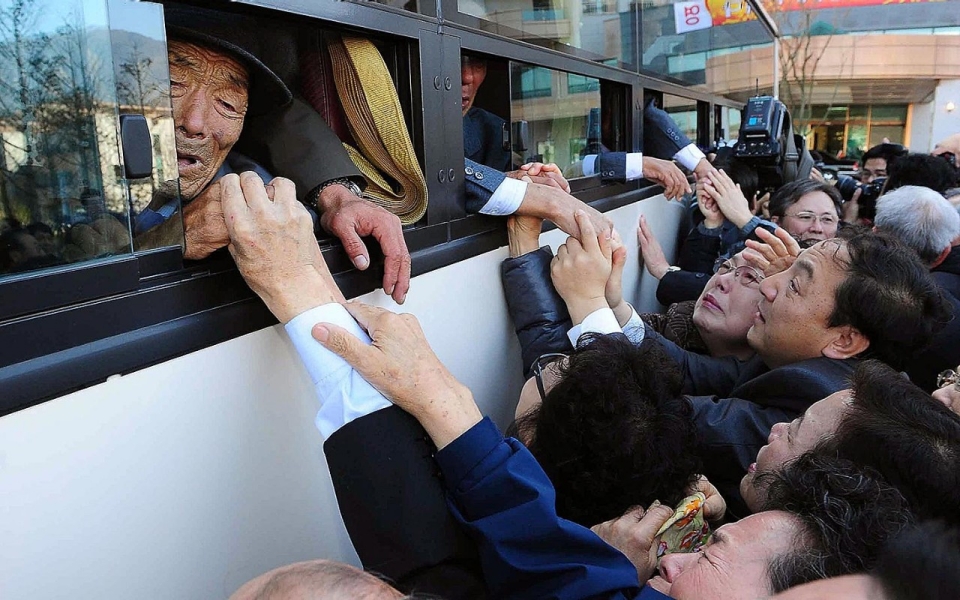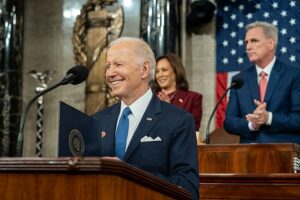Time Is Running Out for Korean Families Torn Apart by War

North Koreans on a bus and their South Korean relatives, separated since the Korean War, bid farewell after a brief family reunion. Picture by Kim Ho-Young-Korea | Pool | Getty Images

“Do you remember all the stories and information I have told you about my parents and siblings in the North? Do never forget and please do try to find them when we are unified. Tell them I had a wonderful life with an amazing granddaughter like you and that I have not spent a second of my life not missing them.” These were the last words my grandfather said before he passed away last year.
My grandfather was drafted to fight for the North Korean army in the Korean War at the age of 18. Afterward, he lived 65 years separated from his three younger siblings and parents. Millions of families torn apart by the Korean War are still separated by the world’s most fortified border—the Demilitarized Zone. The peninsula was divided into the North supported by the Soviet Union and the South backed by the United States at the end of the Korean War in 1953. With no contact allowed between the citizens of the two countries, most families do not know the fate of their relatives back home.
Now time is running out while the countries that participated in the war—the United States, China, Russia, and Japan—focus on their own national interests. North Korea uses the desperation of separated families as political leverage. Moscow, after the deterioration of Russo-American relations over Ukraine, is looking for a discreet friendship from North Korea to counter the United States.
The occasional mention of the issue is overshadowed by the prioritization of nuclear disarmament and joint military exercises of South Korea and the U.S. But the separation of these families is an urgent humanitarian crisis in the region. And the participating countries of the Korean War are not free from responsibility. Political agendas should not sweep the separated families under the rug.
The first successful negotiation in 1985 allowed for one round of exchange visits by 50 family members from each side. But the process stalled for the next 15 years. A breakthrough came under the Sunshine Policy of the Kim Dae Joong (1998-2003) and No Mu Hyun (2003-2008) administrations in South Korea. From 2000 to 2007, the two Koreas held sixteen rounds of family reunions, allowing 100 families from each country per round.
But the majority of families, like my grandfather’s, have lost the hope due to the scarcity and small-scale of these events. Since 2007, these rare three-day reunion events have been on and off depending on the political tides. When the conservative party, critical of the North’s nuclear weapons program, took power in 2008, Seoul abandoned the Sunshine Policy. The family reunions were restored in 2009, but suspended again the following year. In February 2014, the Koreas held reunions for the first time in over three years. Given North Korea’s deteriorating relations with South Korea and the United States, another reunion event in near future is unlikely.
And the populations in both Koreas are growing old. Some 3,500 people from separated families passed away in 2014 alone, according to the Ministry of Unification’s Integrated Information System for Separated Families. As of February, only 68,000 of the more than 129,000 registered family members are still alive. Around 82 percent of them are over the age of 70. The average life expectancy is 81.37 years old in South Korea and 69.50 in North Korea.
Even as North and South Korea relations sour, international governance must uphold the basic human right to family life. The countries involved in the war need to establish a separate international humanitarian forum or summit free of political and economical interests and agenda. The goal of such forum would be to regularize reunion events and increase the number of participants allowed.
North Korea’s philosophy of self-reliance informs its foreign and domestic policies. But that does not mean total isolation. North Korea depends on friendly hands stretched out by China and Russia for political leverage and economic survival. Even North Korea’s doors cannot stay shut to concerted humanitarian demands from these countries.
Although my grandfather had a wonderful life with his family in the South, he was robbed of his fundamental right to live and age with his family in the North. It is now time to look past political power grabbing and focus on reuniting the separated families, so that relatives may again hold the hands of their loved ones before life takes them away.
Ji Min is a first year master’s student in politics, with a concentration in political theory. Ji Min graduated with a bachelor’s degree from Franklin and Marshall College, majoring in government with a concentration in modern political theories and philosophy. Her research interests include the history of political philosophy, theories of justice and social contract theories.





